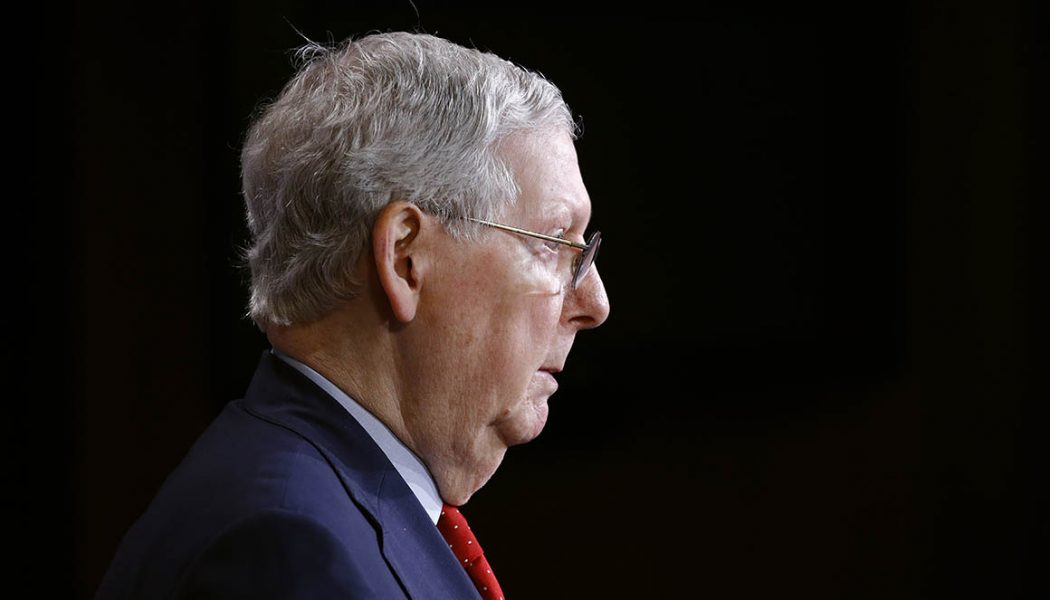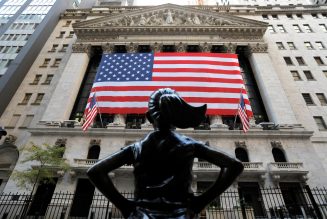But economists from a broad range of ideological backgrounds are encouraging Congress to keep spending to combat catastrophic job losses — and say now is not the time to focus on the deficit. They emphasize that the federal government can borrow at near-zero interest rates, as investors seek the safety of U.S. bonds and the Federal Reserve buys up tens of billions of dollars worth of Treasury securities each week.
GOP concerns over the deficit will play a central role in negotiations as lawmakers begin working on the next emergency spending bill and Democrats push for more funds for state and local governments.
Meanwhile, because so much normal economic activity has evaporated because of safety fears and stay-at-home orders, the threat of a crippling drop in prices is perhaps more of a concern than inflation, many economists say.
“I’m a fiscal hawk from way back, and all of my heebie-jeebies are going off when I see these numbers,” said Douglas Holtz-Eakin, a Republican who used to head the Congressional Budget Office and is president of American Action Forum. “But then I look at the scale of the problem, and I think, yeah, that’s that. Gotta do it.”
Senior Republicans have signaled that they are willing to spend far more money to help the neediest Americans, especially as more than 26 million Americans have filed for unemployment claims in recent weeks. But it’s clear that much of the GOP’s patience is diminishing as the price tag for the tranches of coronavirus aid amounts to trillions. Senate Majority Leader Mitch McConnell (R-Ky.) is insisting that any future package needs to have more guardrails, including protections for health care workers, businesses and employers from lawsuits.
“I would question the credibility of any economist who thought that borrowing $2.8 trillion was a great idea except in a pandemic,” McConnell said in an interview. “If we borrow any more it will include reforms.”
Republicans say they also want to see how the money Congress has already approved is playing out before deciding on where to allocate more resources to combating the virus and shoring up the economy.
Democrats have pounced on the GOP’s growing unease over the deficit, which they say has surfaced only after Republicans secured hundreds of billions for businesses — including some with massive cash flows and savings accounts.
“When we talk about tax cuts and when we talk about loopholes for real estate developers, it’s utmost urgency,” Rep. Alexandria Ocasio-Cortez (D-N.Y.) told reporters in the Capitol last week. “But when we talk about rent and mortgage relief for working families, now we’re worried about the deficit.”
Among the sticking points for the next phase of negotiations is a push from Senate Democrats for money directed toward state and local governments facing a steep drop in revenue as they attempt to battle the virus. McConnell suggested this week he is open to aid for local governments as long as his conditions are met.
“I don’t think you can … indefinitely kind of extend what we’ve done over the last couple months,” said Sen. Mike Braun (R-Ind.) when asked about the next phase. “That has to be looked at in a very hard fashion to see how we can do it in a more affordable and a smarter way.”
The Republican Study Committee’s Budget and Spending Task Force also put out a blueprint this week to flatten the “debt curve.” The proposal calls for Congress to offset the effect of future coronavirus packages on the debt by cutting and capping spending.
Some experts say interest payments could eat up an unsustainably high portion of the federal budget down the road, particularly if the economy has a strong recovery that leads rates to rise. Similarly, as the economy improves, high levels of government spending could feed aggressive price increases.
“There’s a real danger that at some point we’re going to create serious inflation and seriously higher interest rates,” Toomey said. “And the problem is, we don’t know when we’ll hit that point.”
But some economists caution that even those worries could be overblown; widespread inflation fears after the Great Recession of the late 2000s never came true, and structural economic factors have led to a steady decline in rates over the past few decades.
“Interest rates could rise a fair bit from where they are now and still be lower than they were for most of the last half century,” said Doug Elmendorf, a Democrat who served as CBO director until 2015 and is now dean of faculty at Harvard Kennedy School.
“And inflation — oil prices were briefly negative last week,” he added. “We are much more worried now about a deflationary spiral from weak economic activity than we are about high inflation.”
Meanwhile, some progressive economists go even farther, suggesting deficits don’t pose nearly as many problems as claimed by mainstream economists.
Republicans’ renewed worries about the national debt come after a GOP-led Congress in 2017 added more than $2 trillion to the deficit through tax cuts and increased spending, at a time when the U.S. economy was relatively healthy and interest rates were higher. Republicans argued that the tax cuts would pay for themselves by generating enough economic growth, a goal that has so far fallen short.
“We should’ve been doing deficit reduction when the economy was good,” said Marc Goldwein, senior policy director at the Committee for a Responsible Federal Budget. “Now is not the time.”
“That does not mean we should waste dollars. It does not mean we should spend infinite amounts,” he added. But, “it’s a worthwhile tradeoff to have more debt today, which isn’t free, to not go into a depression.”
Lou Crandall, chief economist at Wrightson ICAP, a research firm specializing in U.S. government financing, also pointed out that ballooning deficits could increase pressure to roll back those tax cuts going forward and suggested that might be a motivating factor for Republicans to be cautious. “This is defending the signature achievement of the Trump era,” he said.
The $2 trillion CARES Act passed by Congress last month amid the pandemic will increase federal deficits by $1.8 trillion over a decade, according to the CBO. That estimate doesn’t project any losses from the Fed’s emergency lending programs because the central bank is planning to lend largely to creditworthy businesses and municipalities.









